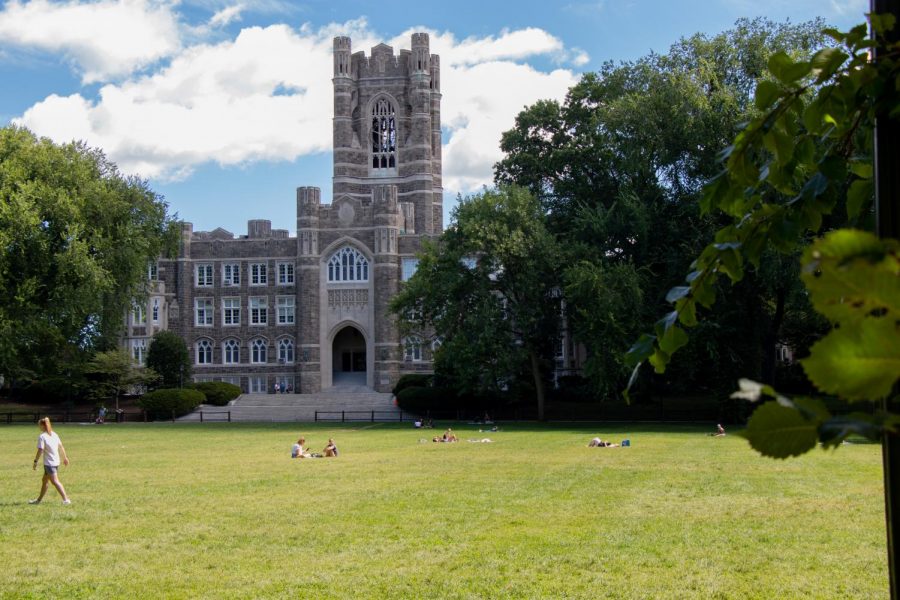Fordham Ranks 203rd in Social Mobility
The University Ranked 66th Overall but Placed in the Bottom Half for Social Mobility
Some students and faculty believe that rankings do not mean much since the deciding factors used do not reflect recent concerns. Others say that an increase in the national ranking can help with careers after graduating.
October 1, 2020
Fordham placed 66th out of 389 schools in its category in the U.S. News and World Report’s (USNWR) 2021 list of national research universities. This is an improvement from last year’s ranking of 74th, amounting to a 2% increase. University President Rev. Joseph M. McShane, S.J., addressed Fordham University’s new ranking in a Sept. 13 email to the Fordham community.
Fordham placed 203rd in the “Social Mobility” sub-ranking, putting the university in the bottom half of schools in the category.
USNWR began to include “social mobility factors” in its ranking formula in 2018. This sub-ranking was created with two main factors in its methodology: it calculates the graduation rate of students who received Pell Grants and it compares the result with the graduation rate of students who do not receive Pell Grants.
In 2018, USNWR said Pell Grants are awarded to students from families with annual household incomes under $50,000, and that “most Pell Grant money goes to students with a total family income below $20,000.”
Despite this progressive change to evaluate schools’ inclusivity of different social classes, the best college research tools offered by USNWR are kept behind a paywall, even though the news organization already profits off of the private information of registered users of their website.
“I think it’s paramount that rankings consider how schools foster students’ physical and mental well-being.” Loreen Ruiz, FCLC ’21 and USG president
Bob Howe, assistant vice president for communications and special adviser to the president, said that rankings were a bit misleading. “A rank of no. 203 puts us at no. 23 among the top 70 schools in the U.S. News, and no. 34 among the top 100; as well as no. 6 among private schools in the top 70, and .no 8 among all schools in the top 100—we are tied with Princeton at #203, after all,” he said. “But just to show you how subjective the rankings can be, the Chronicle of Higher Education (CHE) ranked Fordham at #15 nationally for social mobility two years ago.”
That 2018 CHE article rated Fordham 15th in mobility rate among 4-year private non-profit institutions. The article focused on the rate of students from families in the bottom 20% of household income distribution who made it to the top 20%. Only the top three schools on the private-institution list would have made the top 20 on the public school rankings.
USNWR uses multiple factors to calculate its ranking system. These factors include student outcomes, faculty resources, the academic reputation of the university and student selectivity for the previous entering class.
A 2018 study from Stanford University’s Graduate School of Education criticizes the USNWR’s ranking system for not giving the most weight to factors that students and families are most concerned with.
This year’s ranking list uses data from 2019 in its calculations, meaning that key issues of 2020, such as the coronavirus pandemic and the movement for racial justice, are not reflected in this year’s USNWR ranking system.
Loreen Ruiz, Fordham College at Lincoln Center (FCLC) ’21 and United Student Government (USG) president, said that USNWR’s formula should consider categories that are important to students, such as racial diversity on campus.
“I’ve spent my summer and fall semester listening to students,” she said. “They have made it clear, and I agree with them, that diversity—particularly racial diversity— in both Fordham’s student body and in its hiring of staff and faculty should be a priority.”
Ruiz said she has heard concerns about student health on campus. “In the middle of this pandemic, students are especially concerned about their health: Whether it’s having the ability to get tested for COVID-19 at any time or having adequate mental health support, I think it’s paramount that rankings consider how schools foster students’ physical and mental well-being,” she said.
Fordham University officials have a history of labeling college rankings as arbitrary. Howe said that ranking systems fail to capture the quality of a university.
“Imagine ranking the museums in New York City: how could you measure the American Museum of Natural History against the Metropolitan Museum of Art?” he said.
“They’re both large, world-class museums adjacent to Central Park. They offer very different experiences and of course very different collections: it’s apples and oranges. The same is true for university rankings, even if you’re just comparing liberal arts institutions. They offer different physical settings, with different strengths in academic areas, different social climates, different student bodies, and different extracurricular activities. This is why enrollment professionals are so focused on a student’s ‘fit’ for their school: they want to recruit students who will thrive at their institution, and who will succeed at their academic goals.”
“Certainly, college rankings within national lists matter to me.” Daniel Malave, FCLC ’23
In a January 2019 email, McShane said that higher rankings increase the value of a Fordham degree, help with fundraising and make it easier to recruit the best students and faculty.
Students’ reactions to these college rankings have also varied in the past. While some students ignore these rankings altogether, Daniel Malave, FCLC ’23, said that he sees the benefit of Fordham’s increased ranking.
“Certainly, college rankings within national lists matter to me because it is indicative of not only the university’s academic reputation, but also their ability to foster successful networking cliques between students and industry experts as well as demonstrating the university’s ability to become instantly recognizable by experts on the matter,” he said
Malave also sees how Fordham’s increased overall ranking can help his career. “For me, life after Fordham comes down to searching for the dream job in academia itself as a professor … the university bearing a more prestigious image would directly impact the success of my goals in a most positive way,” he said.
Meanwhile, Ruiz said the value of her Fordham education cannot be represented in a ranking system.
“Personally, my favorite parts about Fordham are its kind and caring community, as well as its array of student organizations and support mechanisms,” she said. “From Campus Ministry to Counseling and Psychological Services, I believe that Fordham offers support and social opportunities for every student. These factors can be hard to measure, which is why I encourage prospective students to take time to learn about the student experience at potential universities rather than being so fixated on rankings.”















